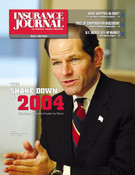Leaving aside the insurance brokerage compensation investigations, the World Trade Center trial, the St. Paul-Travelers merger and the UnumProvident settlement, all of which have their roots in this region but grew to become national insurance stories; and bypassing most reform proposals and debates that were interesting but went nowhere; and excepting mergers and other business decisions by individual insurers and agencies; and staying within the realm of property casualty issues; and moving past the forces of competition and cycles; and, finally, factoring in limited availability of space, the following 2004 insurance events in the East region from Maine to Virginia were worthy of note:
CONNECTICUT
Med-Mal Hike Under Fire: A coalition of trial lawyers and consumer groups challenged a medical malpractice insurer’s plan to increase premiums in Connecticut an average 89.6 percent. The insurance department cleared the rate hike for GE Medical Protective, however Commissioner Susan Cogswell agreed to review what the groups said is an “excessive” and “unconscionable” price increase. Rell Reappoints Cogswell Newly-installed Conn. Gov. Jodi Rell asked Susan Cogswell, current insurance commissioner, to remain in the post, and Cogswell accepted the reappointment. Former Gov. John Rowland first appointed Cogswell in June 2000. Gov. Rowland, Former Insurance Agent, Resigns John Rowland, a member of a prominent Connecticut insurance and political family and himself a former insurance agent, resigned as governor of Connecticut rather than testify before a legislative panel investigating his possible impeachment. Republican Lt. Gov. M. Jodi Rell replaced Rowland on July 1 for the rest of his term. Rowland Signs Terror Exclusion Law Connecticut Gov. John Rowland signed into law legislation to create a terrorism exclusion in the state’s Standard Fire Policy. Rowland Vetoes Med-Mal Measure Gov. John G. Rowland vetoed legislation designed to address the state’s medical malpractice market. Rowland, and many in the medical and insurance industries, opposed the measure because it lacked caps on damage awards.
DELAWARE
Denn Defeats Ennis for Delaware Post Democrat Matthew P. Denn, former legal counsel to Gov. Ruth Ann Minner, won the insurance commissioner’s race over Rep. David Ennis, (R-Wilmington). Denn campaigned as an advocate for insurance consumers, vowing to curb auto insurance and health insurance costs. Denn replaces Republican Donna Lee H. Williams. Delaware Lowers Drunk Driving Threshold Delaware lawmakers agreed to join the rest of the nation by lowering the blood-alcohol threshold for drunken driving.
DISTRICT OF COLUMBIA
Insurance, Banking Departments Merge Mayor Anthony Williams signed into law a bill combining the Department of Insurance and Securities Regulation with the Department of Banking and Financial Institutions. The new agency is named the Department of Insurance, Securities and Banking and is headed by Lawrence H. Mirel.
MAINE
Maine Supreme Court Strikes Down Limit on Uninsured Motorists The Maine Supreme Judicial Court ruled that insurers might not restrict their liability under uninsured motorists coverage to less than what Maine law requires. Maine Revamps Workers Comp Board Gov. John E. Baldacci signed into law a restructuring the Maine Workers Compensation Board which he hoped would end the gridlock that has frustrated the board’s ability to carry out its statutory responsibilities. Iuppa Reappointed Superintendent Gov. John E. Baldacci reappointed Alessandro A. Iuppa as superintendent of the Bureau of Insurance. The appointment is for a five-year term. Iuppa was initially appointed superintendent in 1998. Maine Publishes P&C Market Survey A Maine Bureau of Insurance report indicated that overall premiums have risen an average 30 percent over the last three years. The report concluded that homeowners insurance was among the most difficult personal lines coverage to obtain. For businesses, liability insurance for apartment owners and general contractors were the most difficult.
MARYLAND
Maryland Attempts to Solve Med-Mal Crisis Legislation that would offer doctors immediate relief from increases in malpractice insurance premiums and hold the line on future rate hikes was presented to the Maryland General Assembly leaders by Gov. Robert L. Ehrlich Jr. But months of negotiations with Senate and House leaders failed to produce a funding mechanism or a final piece of legislation by mid-December. Maryland Creates Isabel Relief Fund Gov. Robert L. Ehrlich Jr. signed emergency legislation to provide housing relief for Maryland victims of Hurricane Isabel. Maryland Seeks Flood Program Changes Fueled by the complaints from victims of Hurricane Isabel, Maryland insurance officials issued a report calling for changes in the way the National Flood Insurance Program is run. Maryland Releases Credit Study A report by the Maryland Insurance Administration on credit-based insurance scoring found no basis for any conclusion that credit history is skewed toward ethnic minorities or low-income individuals.
MASSACHUSETTS
Mass. Approves New Residual Auto Plan After years of industry complaints and months of wrangling, Massachusetts has overhauled its system of insuring high risk drivers. Insurance Commissioner Julianne M. Bowler issued an order approving new rules for what proponents hope is a more equitable distribution of high-risk drivers among insurers in the state’s residual auto insurance market. The result is that the Massachusetts Assigned Insurance Plan (MAIP) will be implemented as an assigned risk system as of Jan. 1, 2008, following a three-year transition period. Grand Jury Indicts 16 for Alleged Mass. Auto Fraud Sixteen people, including three lawyers and four chiropractors, were indicted by a special grand jury in Essex County for their alleged involvement in auto insurance fraud in Lawrence, Mass. The crackdown on fraud has resulted in dozens of arrests and a severe reduction in auto accident insurance claims. Mass. Approves Commercial Auto Market Reforms Massachusetts approved a limited servicing carrier program for the state’s commercial auto residual market in an attempt to streamline the way high risk commercial auto risks are handled. Mass. Adopts Fire Safety Legislation Gov. Mitt Romney signed the Commonwealth’s most far-reaching fire safety legislation since the Cocoanut Grove fire in 1942, strengthening laws to prevent tragedies like the 2003 Station nightclub fire in Rhode Island. Mass. Supreme Court Clears Way for Gay Marriage In a landmark ruling, the Massachusetts Supreme Court held that same-sex couples are allowed to marry under the state constitution. Lawmakers Approve Commercial Deregulation The state deregulated insurance rates and forms for certain large commercial risks. The new law permits commercial accounts with more than $30,000 in premium that also meet several other criteria to choose to be exempt from the state’s prior approval of rate. Cape Homeowners Face Crisis When Andover Group began notifying 14,000 homeowners on Cape Cod of nonrenewals, the tight market in coastal areas drew media attention.
NEW HAMPSHIRE
N.H. Weighs Cut in Insurers’ Premium Tax New Hampshire indicated it might be the first Eastern state to lower its tax on insurance companies as states continue to compete to attract more business. The issue is the subject of an economic study that is expected by the end of the year, in time to fashion legislation for January. N.H. Insurers Get 2.5% Comp Rate Hike Workers’ compensation writers in New Hampshire received approval for an average 2.5 percent hike for voluntary market advisory loss costs effective Jan. 1, 2005. N.H. Orders Audit of Insurance Broker Fees The New Hampshire Legislature’s audit division began looking into fees paid to brokers for handling the state’s insurance contracts. Broker fees became an issue when a former volunteer for Gov. Craig Benson was paid to work on the state’s health insurance contracts.
NEW JERSEY
Former Agent Codey Becomes N.J. Governor Richard J. Codey, long time Democratic legislator and local independent insurance agent, became New Jersey’s acting governor. Codey assumed the office from James McGreevey, who resigned following his admission of an extramarital gay affair. New Jersey Auto Market Continues to Improve A flurry of special dividends and a series of rate reduction announcements from auto insurers, coupled with increased competition and new regulations have helped reshape the state’s long-plagued auto insurance market. State Farm Indemnity announced it would drop plans to withdraw and Liberty Mutual and Allstate Insurance decided to return. N.J. Med-Mal Subsidy Fund Approved New Jersey will provide doctors with an estimated $26 million each year for the next three years to help them pay for malpractice insurance and assist hospitals with the cost of free care.
NEW YORK
N.Y. to Reassess Auto Rates New York Superintendent of Insurance Gregory Serio began a review of auto insurance rates for private passenger vehicles in New York State. Serio said the review was justified by dramatic decline in losses due to successful anti-fraud efforts. Denied 29.3% Hike, N.Y. Workers’ Comp Writers Refile for 9.3% Their average 29.3 percent increase having been rejected by state officials, workers’ compensation insurers in New York refiled for an average 9.3 percent increase. The original recommendation to increase premiums by 29 percent was called “stunning and frightening,” by the Business Council of New York. 43 Indicted in N.Y. Auto ‘Fraud Factory’ Superintendent of Insurance Gregory V. Serio and other officials announced the indictment of 43 individuals and corporations for engaging in a no-fault automobile insurance scheme. The group included a reputed Bonanno crime family associate. Builders Form Own Liability Insurer Having seen the pool of private insurers selling their policies dry up, home builders in New York decide to provide their own coverage. The New York State Builders Association formed the Reciprocal Liability Insurance Company. Credit Scoring Bill Becomes Law Under a measure that became law without Gov. George Pataki’s signature, insurers are not allowed to deny coverage based solely on a credit score or to nonrenew or increase premiums based on credit information.
PENNSYLVANIA
Pa. Revises Insolvency Law Insurers SB 815, signed into law by Gov. Ed Rendell (D) in June, marked the successful conclusion of a multi-year effort to fix problems arising from the Reliance Insurance Company insolvency. The “large deductible law” promised significant savings for insurers (estimated to total $600 million) by changing the way that payments made to insolvent insurance companies are handled. Pa. Extends Subsidies for Doctors Lawmakers approved a one-year extension on MCare relief for physicians practicing in Pennsylvania. Drunk Driving Law Updated Pennsylvania changed its drunk driving laws, including lowering the legal blood-alcohol level for driving under the influence of alcohol. The law imposes increasingly harsher penalties on drunk drivers based on their blood-alcohol.
RHODE ISLAND
Court Holds Nightclub Owners Personally Liable The Rhode Island Workers Compensation Court ruled that the owners of The Station nightclub could be held personally liable for their failure to obtain required workers’ compensation coverage, meaning that the brothers’ personal assets could be tapped to pay the more than $1 million fine. Beacon Mutual Pursues Expansion Beacon Mutual Insurance Co., Rhode Island’s largest workers’ compensation insurance writer, put up $20 million to create a subsidiary, Castle Hill Insurance, to sell to out-of-state employees of Rhode Island companies. R.I. Adopts Flex Rating for Personal Lines Lawmakers relaxed regulation of personal lines insurance rates in the state by approving a flex-rating measure that permits insurers to increase or decrease rates by no more than 5 percent within a one-year period without prior approval of the state. Pawtucket Mutual Cancels All Remaining Policies Pawtucket Mutual Insurance Co., and its subsidiary Narragansett Bay Insurance Co., which are under state control, cancelled all remaining policies, a decision forced by the high cost of reinsurance. R.I. Law Allows Terrorism Exclusion A new Rhode Island law allows for a terrorism exclusion from the Standard Fire Policy for certain commercial risks. Providence Washington Closes Its Doors Providence Washington Insurance Companies announced it would close its doors after more than two centuries. The company entered into an agreement for OneBeacon to acquire renewal rights to its small business package policies.
VIRGINIA
Historic Richmond Hard Hit by Gaston Flooding Tropical Storm Gaston led to widespread flooding in Richmond, Va., that left at least five dead and devastated the historic Shockoe Bottom district that was the heart of the Confederate capital during the Civil War. Gov. Mark R. Warner declared a state of emergency. Va. Weighs 4.9% Workers’ Comp Hike Virginia put under consideration a request by the industry to increase workers’ compensation premium levels for industrial classes by an average 4.9 percent in the voluntary market.
VERMONT
Vermont Welcomes 700th Captive Helmerich & Payne Corporation became Vermont’s 700th captive insurance company. Vermont began licensing captive insurance companies in 1981. Gov. Douglas Signs Workers’ Comp Changes Gov. James Douglas (R) signed workers’ compensation reform legislation supported by the industry. The new law reduces the statute of limitations for filing a claim from six years to three years and requires creation of a medical fee schedule. Intentional Sexual Harassment Not Covered The Vermont Supreme Court rejected an effort by two women to collect from insurance companies covering the home and business of a man they said sexually harassed them. The victorious three insurance companies covering the defendant and the business refused to pay, saying their policies covered accidents, but not intentional sexual harassment. Vermont Approves Workers’ Comp Hikes Commissioner John P. Crowley approved workers’ compensation rate increases of 10.3 percent in loss costs for the voluntary market and 14.2 percent in the assigned risk market, effective April 1, 2004.
Topics Carriers Auto Agencies Legislation Fraud Flood Workers' Compensation New York New Jersey Massachusetts Virginia Maryland Connecticut Delaware
Was this article valuable?
Here are more articles you may enjoy.


 Zurich Insurance Said to Near Beazley Deal Funded by Equity Sale
Zurich Insurance Said to Near Beazley Deal Funded by Equity Sale  Waiting for Hormuz, More Oil Tankers Gather in the Persian Gulf
Waiting for Hormuz, More Oil Tankers Gather in the Persian Gulf  Kyle Busch and Wife Settle Lawsuit With Pacific Life and Insurance Agent
Kyle Busch and Wife Settle Lawsuit With Pacific Life and Insurance Agent  Deep Freeze and Drought Fueled a Massive Florida Wildfire
Deep Freeze and Drought Fueled a Massive Florida Wildfire 


